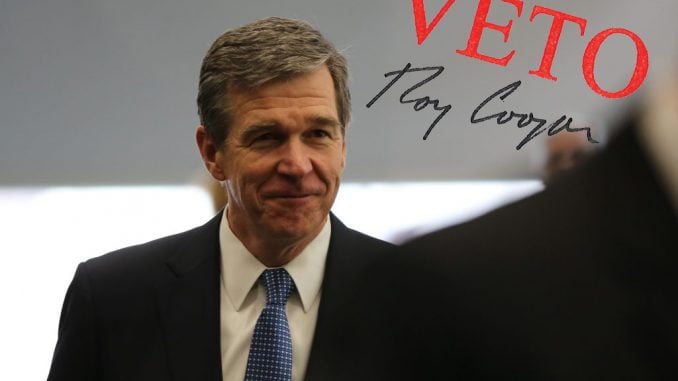

RALEIGH — Democratic Gov. Roy Cooper made the 95th veto of his two terms over billboard signage vegetation clearing in a North Carolina Department of Transportation agency bill.
House Bill 198 contains requests made by the N.C. Department of Transportation (NCDOT) that include changes to various contracts, turnpike fees, extension of the Build NC Bond Act and the Outdoor Advertising Control Act, which is the section the governor carved out in his veto.
The changes to the Outdoor Advertising Act expand the areas and authority for outdoor advertising owners to remove vegetation around their signs, both with and without permits, while making some procedural changes to the permitting process.
One part of the change to the act expands the area around existing sign locations where owners can cut vegetation up to 300 feet on either side without a permit, increased from 200 feet previously.
“Protecting North Carolina’s beauty should be a top priority, but this legislation allows tree cutting and destruction of native plants around billboards,” Cooper said in his veto message. In February, I signed Executive Order 305, which sets comprehensive goals for restoring and protecting natural areas, prioritizing native plants and planting one million trees.”
The governor also highlighted the state’s scenic views as “one of the reasons why our state just broke records with our tourism economy, and why we have one of the most beautiful places in the world to live.”
Senate Republicans responded with a joint statement by Senate Transportation Committee Chairs Sens. Michael Lazzara (R-Onslow), Tom McInnis (R-Moore) and Vickie Sawyer (R-Iredell).
“House Bill 198 is bipartisan, compromise legislation that the governor’s own transportation agency helped put together,” the senators wrote. “Gov. Cooper’s partisan veto of this bill shows he values his relationship with Green New Deal liberal advocacy groups more than implementing good policy. We look forward to overriding Gov. Cooper’s latest misguided veto.”
The bill passed the Senate by a vote of 30-14 and the House by a vote of 65-38. No Democratic senators voted to approve the measure while six Democrats in the House voted for passage: Reps. Cecil Brockman, Ashton Wheeler Clemmons, Carla Cunningham, Marvin Lucas, Garland Pierce and Michael Wray.



